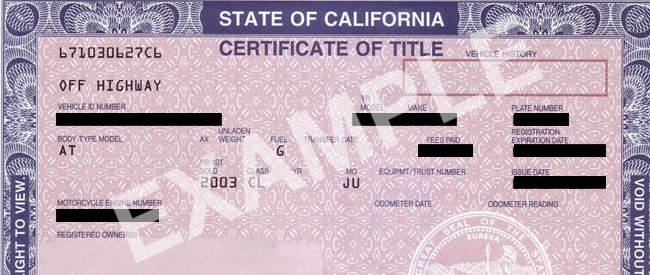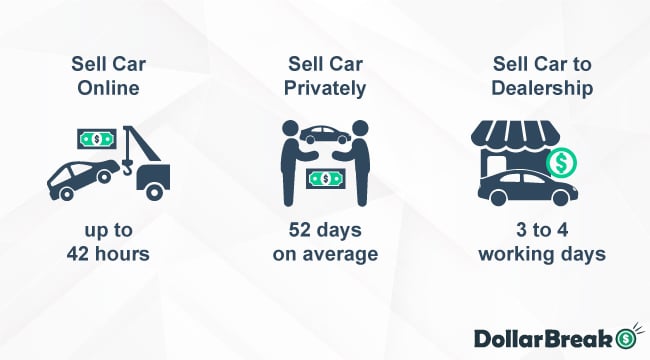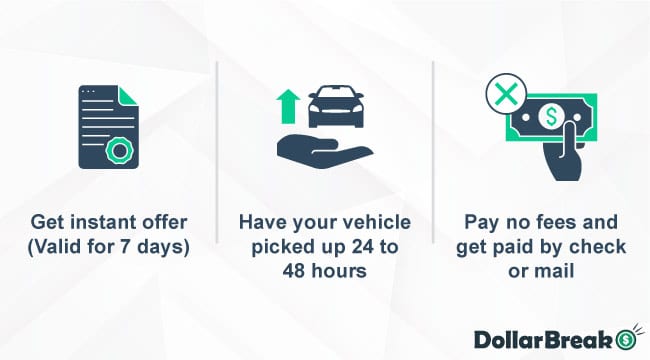Quick Answer:
Navigating the process of managing a deceased person’s assets involves several key steps, such as locating the will, initiating the probate, and ensuring all fees are settled.
When selling their car, it’s vital to transfer the title, collect the necessary documentation, choose the best method for sale, and remember to cancel the insurance.
Key Takeaways:
- Probate Necessity: Selling a deceased person’s car requires completing the probate process to transfer ownership legally.
- Executor’s Debt Clearance: The estate’s executor must resolve any outstanding car debts before selling.
- Selling Method Consideration: Choose the most efficient and convenient method for selling the car, like online platforms, private sales, or dealerships.
Best for Older & Damaged Cars

Buys used, damaged or junk cars
Free tow and no hidden fees
Pays by ACH trasfer or check
Top Pick for Junk Cars

Free, no-obligation cash offers
Offers free paperwork service
Pays on the spot upon pick up
How To Sell A Car Of A Deceased Person?
1. Find a Will
Locating a will can be a crucial part of settling an estate after someone has passed away, but it can also be a challenging task.
How to find a will:
- Search Home Files: Begin by searching through personal files, desks, cabinets, and other storage areas where the will might be kept.
- Contact Attorney: If the deceased had legal counsel, contact them to see if they have a copy of the will.
- Check the Safe Deposit Box: If you know that the deceased had a safe deposit box, and you have legal access, check there.
- Ask Close Family and Friends: Sometimes other people may know where the will is stored.
- Check with Local Probate Court: Some jurisdictions allow wills to be deposited with the local court for safekeeping.
- Consult Financial Advisors: Sometimes accountants, financial planners, and other advisors may have information about the location of the will.
- Check for Digital Copies: Nowadays, some people also store important documents digitally. Check computers, emails, or cloud storage services if you have legal access.
2. Initiate the Probate

Having a will makes the car-selling process relatively straightforward. If you are mentioned as an executor, you will be responsible for listing all deceased person’s assets and informing beneficiaries about the probate process.
How does probate work:
- Submit the death certificate and the will to the local court.
- File a petition to start the probate process.
- Receive permission to administer the estate.
- Provide a list of assets and debts.
- Use funds from the person’s estate to pay any debts (loans, credits, etc.)
- Distribute assets to beneficiaries.
- File a petition to the court to close the estate (end the probate process).
If you fail to initiate the probate, the will becomes ineffective, and you won’t be able to prove your vehicle ownership.
Cases when you do not need probate:
- Joint Title – if there is a joint title and your name is listed as co-owner.
- Spousal Transfer – some states, like California, Texas, Florida and others, allow the surviving spouse to transfer the car into their name without probate.
- Transfer on Death (TOD) Registration – in most states, if the deceased person had TOD registration and specified a beneficiary, probate isn’t required to transfer the car’s ownership.
- Living Trust – if the car was included as a living trust with your name as the owner.
- Small Estate Affidavits – most states allow the sworn written statement used to settle an estate of someone who has passed away. Each state has its regulations determining what is a small estate.
If there is no will:

If there is no will, it is considered that the person died “intestate”, and the probate court will determine how the estate is divided among surviving family members and appoint an administrator.
Responsibilities of the appointed administrator:
- Identifying Assets – make a list of all the assets that belonged to the deceased, including bank accounts, real estate, investments and any vehicles.
- Securing Assets – take steps to ensure that the assets are safe and maintained, for example, ensuring the car is securely parked and that insurance is paid.
- Valuing Assets – determining the car’s market value
- Documenting Assets – keep records and provide an inventory of assets to the probate court
State laws will determine who is eligible to inherit the car. This usually follows a particular order: spouse, children, parents, siblings, children of siblings and so on.
If there are no living heirs across all categories, the property is escheated to the state.
3. Check for Unpaid Fees

If the car has a loan or any other unpaid fees (speeding and parking tickets, late registration renewal, etc.), the executor, appointed by the probate, will be responsible for using the deceased person’s funds to cover the debt.
For example, if the car has a loan, it should be paid from any money or property left behind. If there are no funds to cover the debt loan may be considered “unsecured”, and the lender will write it off.
You will be responsible for covering unpaid fees if:
- You have a joint title.
- You are surviving spouse, and the state requires you to share responsibility for certain marital debts.
Assets can not be transferred to beneficiaries until debts are not covered.
4. Transfer the Title

To transfer the title to your name, you will need to provide the following:
- Original Certificate of Title
- Copy of Death Certificate
- Letters of Administration or Letters Testamentary
- Your ID or driver’s license
The process of Title transfer can take anywhere from 2 to 6 weeks and costs $10 to $20 on average.
If you can’t find the original Certificate of Title, you must apply for a duplicate One at the local DMV.
- Provide your personal information (ID card or driver’s license)
- Provide car details (VIN, make, model, year)
- Fill out an Affidavit or Statement form (explain why you need a duplicate title)
Duplicate titles cost $10 to $30 and take up to 6 weeks. Some states offer expedited processing for an additional fee.
Once you transfer title to your name, you are officially the legal owner of the car and can legaly sell the car.
It’s illegal to sell a car without a title. If you lost your Certificate of Title, you must obtain a Duplicate Title.
Some states allow selling the car without a title if you can provide the Bill of Sale and the vehicle meets specific age requirements:
| State | Exception |
|---|---|
| Iowa | If the car is 15 years old or older and you have a bill of sale |
| Maine | If the car is 1995 or newer and you have a bill of sale |
| Massachusetts | If the car is 15 years old or older and you have a bill of sale |
| Montana | If the car is 25 years old or older and you have a bill of sale |
| New Hampshire | If the car is 15 years old or older and you have a bill of sale |
| Vermont | If the car is 15 years old or older and you have a bill of sale |
5. Gather Required Paperwork
To sell a car, you must provide a Certificate of Title and add current odometer readings.
Some states also require additional paperwork: valid emissions test, active registration tag or bill of sale.
After you transfer the title to the buyer, you must sign the Release of Liability form to protect yourself from being held responsible for future fines, damages or injuries.
| Status | Document: | Document: | Document: |
|---|---|---|---|
| Required in All States | Certificate of Title | Odometer Reading | Release Of Liability |
| Required in Some States | Bill of Sale | Registration Tag | Emissions Test |
| Optional Paperwork | Vin Check | Service Records | Owner’s Manual |
Having additional paperwork has its benefits and can increase the car’s value:
- VIN check: A clean history, including no accidents or unpaid fines, raises a car’s value.
- Service records: gives buyer confidence and proves the car is in good condition.
- Owner’s manual: gives the buyer confidence in you as the seller.
6. Ways to Sell Your Car

Ways to sell your car:
- Sell Car Online (up to 48 hours)
- Sell Car Privately (52 days on average)
- Sell Car to Dealership (3 to 4 working days)
Peddle
Wheelzy
CarBrain

Carvana
CarGurus
7. Cancel Insurance
1. Gather Documentation:
- Death Certificate: You will likely need a copy of the death certificate to prove the policyholder has passed away.
- Policy Information: You will need details of the insurance policy, including the policy number.
- Legal Documentation: If you’re not the spouse or a named insured on the policy, you may need legal documentation (like a will or court order) proving you have the authority to make changes or cancellations to the policy.
2. Contact Insurance Provider:
- Phone or In-Person: It’s usually best to speak directly with a representative. Explain the situation and ask what specific steps need to be taken to cancel the policy.
- Customer Service: If you are unable to go to an office in person, calling the insurance company’s customer service number is another option.
- Written Notice: Some insurance companies may require written notice to cancel a policy. This could be via mail, fax, or potentially email.
3. Complete Required Steps:
- Forms and Paperwork: Fill out any required forms or paperwork. This could include an official request to cancel the policy.
- Submit Documentation: Provide all the necessary documentation, which may include sending in copies by mail or providing them in person.
4. Close or Transfer Policy:
- Closing: If no one else is listed on the policy or needs coverage, you can proceed to close it.
- Transferring: If there is another person, like a spouse, who is also a named insured on the policy, the insurance may be transferred to their name.
- Refund: If the deceased person had paid premiums in advance, you might be eligible for a refund. Ask the insurance company about their policy on this.
People Also Asked
Can an executor sell the car before probate?
An executor has no authority to sell a car or other assets of the deceased person’s estate before probate.
Attempting to sell assets before probate without legal authority can create complications and legal issues.
Is a car considered an asset of the estate?
All property owned by the deceased person is considered an estate asset. This includes bank accounts, investments, retirement savings, real estate, business, artwork, jewelry, household furnishing and vehicles.
Can I drive the car of a deceased person?
You can drive a deceased person’s car if you have the estate’s executor’s permission and the car is insured and registered in the state.







